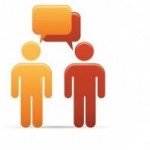“Never before in history has innovation offered promise of so much to so many in so short a time.” – Bill Gates
There’s a lot of buzz these days about peer-to-peer health care – have you heard about it? In this blog post, FoundHealth would like to give you an overview of an emerging trend in online health information.
To give a little background, the first phase of the Internet is often categorized by so–called “static” information (much like that of a printed book or news article). In the beginning, personal blogs gave individuals a platform for their unique voice and first-hand experience. Next, forums became a way for like–minded individuals to center their discussions on certain topics, and to interact with other members of those particular forums. This interaction among online users eventually gave way to the social–networking sites that are vastly changing the face of the Web today.
Enter “Web 2.0.”
 This second phase of the Internet, or Web 2.0, is marked by applications and networked systems of communication that provide an opportunity for vibrant, real–time discussions. These discussions both give context for existing information, and can actually shape the information itself.
This second phase of the Internet, or Web 2.0, is marked by applications and networked systems of communication that provide an opportunity for vibrant, real–time discussions. These discussions both give context for existing information, and can actually shape the information itself.
Now I know what you’re thinking; “I thought ‘Web 2.0′ meant facebook.com, twitter.com and wikipedia.com …so what does it have to do with health care?” To which I’ll tell you, the information seeking and voyeuristic behaviors that were bred out of Facebook are permeating their way into our information seeking behaviors across other, not only social, disciplines as well.
In a tangible healthcare example, consider a conversation between patient and practitioner where the practitioner acknowledges the patient’s symptoms, and subsequently offers treatment information. With the Internet and structures of Web 2.0, this information is now available to the masses, enabling the benefits of that communication to reach beyond the two original conversation participants. Then, a third party, having read this original communication, can also comment against that information, creating a richer context to the original two–pronged dialog. Additionally, we can consider that if each of those original points is consulting numerous other sources, the information available becomes more comprehensive and contextualized.
The value of offline support groups has long been seen as an integral piece in successful treatment regimes and health care. Formal and informal information exchanged among those with the same health condition is an invaluable resource for someone looking for health answers. With the networking abilities of Web 2.0, in many cases these support groups have moved online, thus bridging previous space and time constraints. These interactions among the health information seekers are known as patient–to–patient communications or, more formally, as Peer–To–Peer Health Care.
A recently released Pew Internet Study published by the Journal of Participatory Medicine made a profound discovery; They found that though people still see their specialist or physician as being the best resource in two categories (Diagnosis and Advice on Management After Diagnosis), online support groups were rated as being the best resources for the other 10 (out of 12) categories. Examples of these categories favoring Online Support Groups:
- Best In–depth Information on My Condition
- Best Practical Knowledge of My Condition
- Best for Helping Me Find Other Medical Resources.*
With Web 2.0, collaboration and multiple, ongoing, and real-time authorship has absolutely changed the way we approach Web-based information, if not information offline as well. Needless to say, and as studies show, online social support for health conditions is a much utilized and coveted space that only continues to grow with increasing internet use.
People are sharing treatment experiences on FoundHealth. Be a part of your ongoing online health conversation! Check out some of our newest shared experiences:
Polycystic Ovarian Syndrome and Soy
*For more information on the newly released Peer-to-Peer Health Care findings, check out the links below:
http://e-patients.net/archives/2011/02/health-care-out-loud.html/comment-page-1#comment-75043
One Response to Healing Online: Peer-to-peer Health Care in a Web 2.0 World
Leave a Reply Cancel reply
Your email address will not be published. Required fields are marked *
*
*
You may use these HTML tags and attributes: <a href="" title=""> <abbr title=""> <acronym title=""> <b> <blockquote cite=""> <cite> <code> <del datetime=""> <em> <i> <q cite=""> <strike> <strong>
Join Our Community
Archives
- January 2023
- December 2022
- September 2022
- August 2022
- June 2022
- May 2022
- April 2022
- March 2022
- February 2022
- January 2022
- December 2021
- November 2021
- October 2021
- September 2021
- August 2021
- July 2021
- June 2021
- May 2021
- March 2021
- September 2020
- August 2020
- July 2020
- June 2020
- May 2020
- April 2020
- March 2020
- February 2020
Subscribe

Sign up to receive FREE toolkit
From Dr. Hyman, #1 NY Times & Amazon Author
We never spam or sell your e-mail







Wow this is a great resource.. I’m enjoying it.. good article